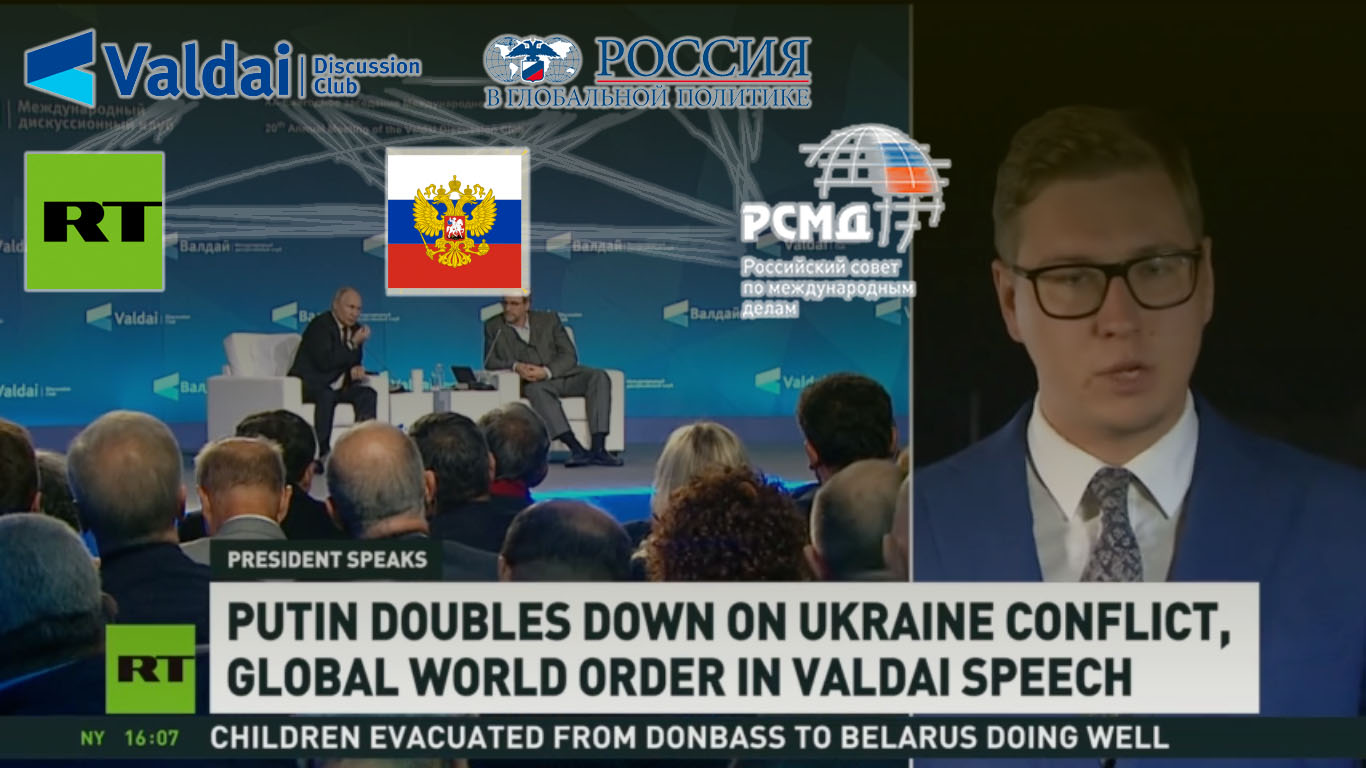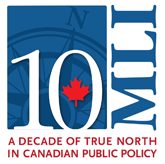The Valdai Discussion Club was founded in 2004 by the Russian government, with significant backing from institutions like the Russian International Affairs Council (RIAC) and the Russian news agency RIA Novosti, in collaboration with the Council on Foreign and Defense Policy and the Moscow State Institute of International Relations (MGIMO). Named after Lake Valdai, where the first meeting took place, it was established to bring together international experts, journalists, and scholars to discuss Russia’s role in global affairs.
In terms of Russia’s global information operations, the Valdai Club functions as a sophisticated tool for influencing international perceptions and narratives about Russia. It operates as a platform for promoting the Kremlin’s geopolitical perspectives and shaping the views of foreign elites, academics, policymakers, and media professionals. The club’s discussions, research papers, and conferences often align with Russia’s strategic interests, amplifying narratives that portray Russia as a stabilizing force in global politics, challenge Western dominance, and frame NATO and the U.S. as aggressors or destabilizing actors.
The Valdai Club also serves to legitimize Russia’s positions by providing a veneer of intellectual and academic credibility to the Kremlin’s narratives. By attracting reputable international participants and integrating their views into its publications and events, the club blurs the line between independent analysis and state-driven propaganda. It leverages these discussions to seed narratives that promote multipolarity, defend Russian actions in places like Ukraine and Syria, and undermine Western unity by fostering skepticism toward liberal democracies.
Overall, the Valdai Club functions as a soft-power instrument that supports Russia’s broader information warfare strategy, which aims to influence global public opinion, weaken adversarial alliances, and shape a global order more favorable to Moscow’s interests.
Valdai Club Founding Organization: Russian Council on Foreign and Defence Policy
One of the founding organizations of the Valdai Club is the Russian Council on Foreign and Defence Policy. It’s head, Sergei Karaganov is a close associate and advisor of Vladimir Putin and Sergei Lavrov.
Karaganov supports Russia’s preemptive use of nuclear weapons against its enemies. Karaganov’s articles advocating for nuclear war have been published on RT.
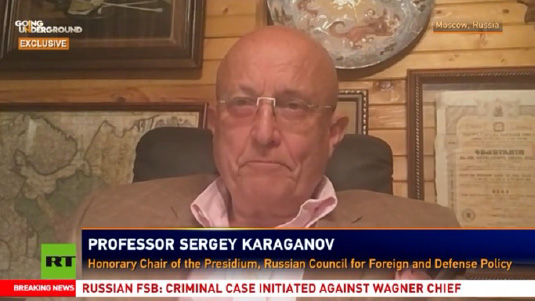 In 2014, Mark MacKinnon of the Globe and Mail interviewed Karaganov and wrote that “Mr. Karaganov sees Russia and the West locked in a “clash of models” – Western-style democracy versus Moscow’s authoritarian capitalism, a struggle he believes could take on a military element.”
In 2014, Mark MacKinnon of the Globe and Mail interviewed Karaganov and wrote that “Mr. Karaganov sees Russia and the West locked in a “clash of models” – Western-style democracy versus Moscow’s authoritarian capitalism, a struggle he believes could take on a military element.”
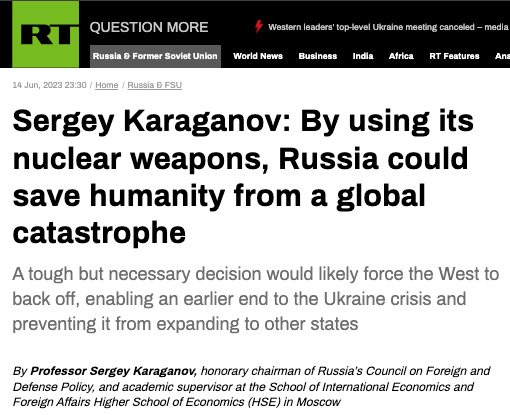 The Russian Council on Foreign and Defence Policy (SVOP) plays a significant role in shaping and supporting Russia’s information operations as part of its broader strategy to influence global perceptions and advance Moscow’s geopolitical interests. Established in 1992, SVOP operates as a think tank that brings together politicians, academics, military experts, and influential figures to discuss and develop strategies related to Russia’s foreign and defense policies. It is closely tied to the Russian state and its foreign policy apparatus.
The Russian Council on Foreign and Defence Policy (SVOP) plays a significant role in shaping and supporting Russia’s information operations as part of its broader strategy to influence global perceptions and advance Moscow’s geopolitical interests. Established in 1992, SVOP operates as a think tank that brings together politicians, academics, military experts, and influential figures to discuss and develop strategies related to Russia’s foreign and defense policies. It is closely tied to the Russian state and its foreign policy apparatus.
The SVOP publishes a magazine “Russia in Global Affairs” to which some western academics contribute, including Canadians, as recently as 2024.
SVOP Role in Information Operations
SVOP’s activities are integrated into Russia’s strategy of using information operations as a tool of statecraft. It provides intellectual and strategic support for narratives that align with the Kremlin’s geopolitical goals, helping to craft arguments that defend Russian policies and criticize Western actions. The council promotes ideas that undermine Western influence, cast NATO and the U.S. as aggressors, and position Russia as a defender of sovereignty and multipolarity in the global order.
Through its research, publications, and participation in high-level conferences (such as those organized by the Valdai Discussion Club), SVOP disseminates these narratives to both domestic and international audiences. It serves as a bridge between Russian policymakers and global opinion leaders, amplifying Russia’s messages through academic and policy networks. By engaging with foreign experts and scholars, SVOP lends credibility to Russian viewpoints and makes them more palatable to international audiences.
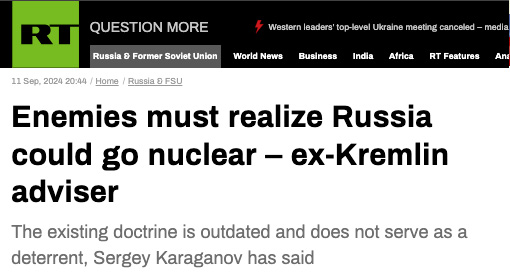 Relation to Russian Intelligence
Relation to Russian Intelligence
While SVOP is not an official branch of the Russian intelligence community, its connections to Russian intelligence are significant. Some of its members and affiliates have backgrounds in the intelligence services, military, or institutions closely linked to the state’s security apparatus. This background enables SVOP to function in alignment with Russia’s broader strategic objectives, often acting as a conduit for narratives that serve the interests of the intelligence community.
SVOP’s role in Russia’s influence operations can be likened to that of a “soft power” arm, where its intellectual contributions help shape the ideological framework within which disinformation campaigns and other covert operations are conducted. The insights and strategies developed within SVOP often feed into the narratives used by state-controlled media, diplomatic channels and Kremlin aligned western influencers.
Strategic Influence and Policy Shaping
SVOP also plays a part in shaping Russian foreign policy by providing recommendations and analyses that influence decision-making processes at the highest levels of government. Its members have access to senior officials, including those within the Kremlin and the Ministry of Foreign Affairs, which allows for a degree of coordination between its output and Russia’s strategic objectives. This integration of statecraft, policy guidance, and information operations creates a seamless connection between intellectual discourse and the execution of influence activities.
Overall, using the veneer of an academic think tank, The Russian Council on Foreign and Defence Policy serves as an instrument of state influence that supports Russia’s information warfare strategies. Its close relationship with state institutions – including military and intelligence – ensure that it plays a pivotal role in the development and promotion of narratives that further Vladimir Putin’s geopolitical aims.
It’s supporting and partnering role of Vladimir Putin’s Valdai Club is a primary example of this activity.
RT and Valdai Club
The Valdai Discussion Club and RT are both tools of Russia’s broader information operations, and while they operate in different domains, they share connections in their purpose, messaging, and influence networks.
Shared Objectives and Messaging
Both the Valdai Club and RT are aligned in their mission to promote Russian geopolitical perspectives and counter Western narratives. They often amplify similar themes: portraying Russia as a legitimate global power, criticizing Western policies, and challenging the dominance of the U.S. and its allies. By framing events from a Russia-friendly perspective, both aim to influence international opinions and destabilize confidence in Western institutions.
Strategic Cooperation and Event Coverage
RT has covered Valdai Club events extensively, broadcasting discussions, interviews, and speeches delivered by Russian officials and international experts who participate in the forum. This synergy allows RT to extend the reach of Valdai’s ideas to a broader audience. RT often highlights statements made at the Valdai Club, especially those by President Vladimir Putin and other senior officials, giving these pronouncements more visibility and shaping how global audiences perceive them.
Overlap in Participants and Experts
There is a notable overlap in the experts, analysts, and commentators who participate in Valdai Club events and those who appear on RT. Many of these individuals have ties to Russian state-backed institutions and are involved in disseminating narratives that align with the Kremlin’s objectives. This overlap in personnel helps create a consistent echo chamber, where messages are reinforced and amplified across different platforms.
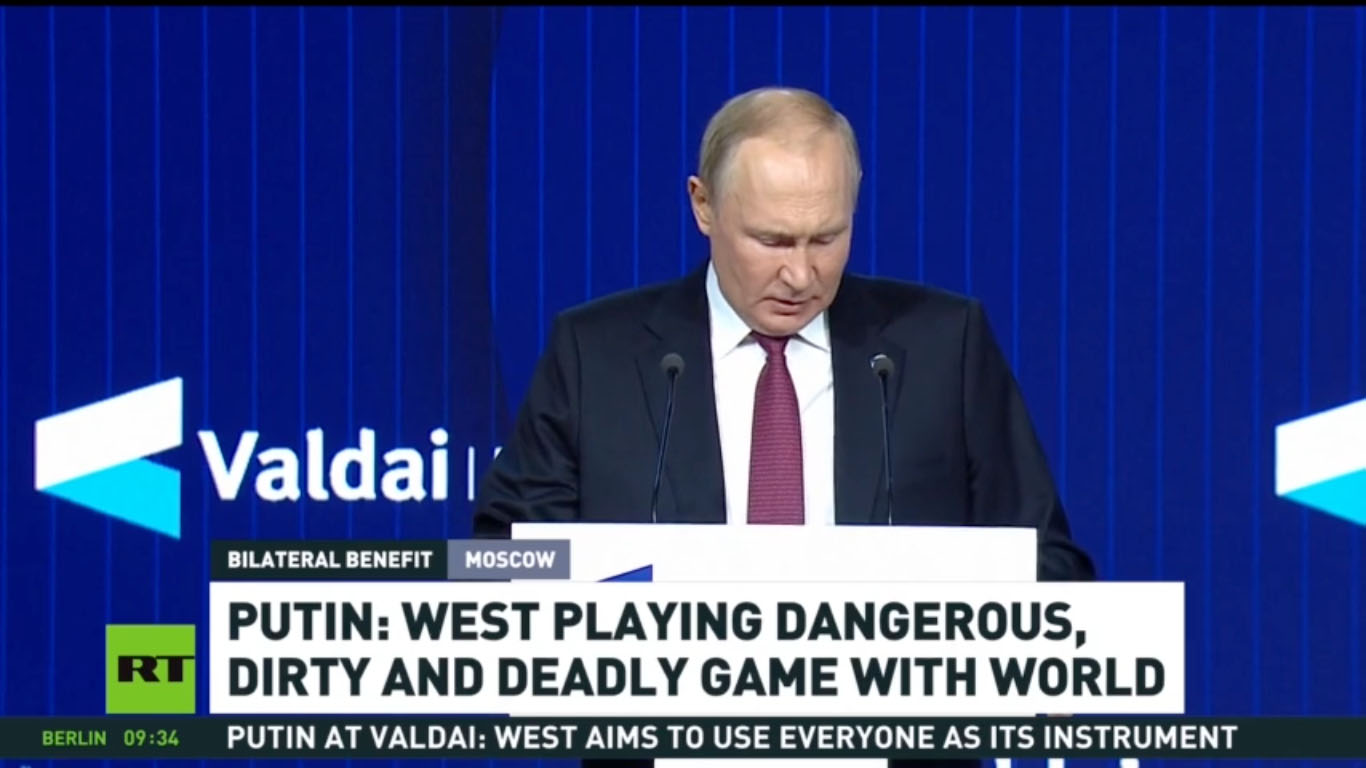
Vladimir Putin Valdai Club Speech 2023 Photo:RT
Western participants and members of The Valdai Club appear on RT and other Russian state backed media. They also contribute to RIAC and SVOP publications, including “Russia in Global Affairs”.
Institutional Alignment and Coordination
Both organizations are ultimately linked to the Russian state and receive support from it. While the Valdai Club operates under the guise of an intellectual and academic platform, RT functions as a state-funded media outlet. This institutional alignment ensures that their efforts are coordinated to enhance Russia’s soft power and support its global information warfare strategy.
The Valdai Club and RT are interconnected components of Russia’s information operations, working in tandem to influence international discourse and advance Moscow’s strategic objectives.
